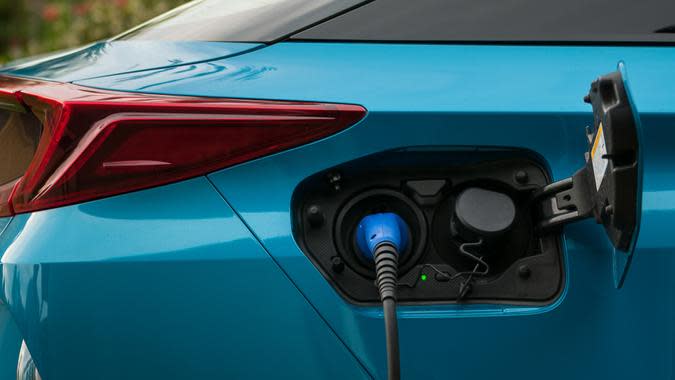5 Questions To Ask Before Buying an Electric Vehicle

So you're ready to cut gas stations out of your life forever. You're ready to take your carbon footprint down a few shoe sizes. You're ready to stick it to the oil companies and you're definitely ready never to pay for gas again. But are you really ready to drive an electric vehicle?
Explore: GOBankingRates' Best Credit Cards for 2023
Do You Have a Tax Question? Ask a Tax Pro
Look Out: Why Buying Property in These Vacation Destinations Could Be a Great Investment
Making the leap from what you've known for your entire driving life to a car without an engine is quite a transition -- although one that more and more drivers are making every year. Ask yourself the following questions before you plug in.

Is It Eligible For a Tax Credit?
Going electric can earn you a federal tax credit of up to $7,500. Since it directly reduces your tax bill on a dollar-for-dollar basis, it's much more lucrative than a deduction. It's not refundable -- you don't get to keep any that might be left over -- but it can bring your tax bill all the way down to zero. The credit had started phasing out once a manufacturer sold 200,000 EVs, which rendered the most popular models from brands like General Motors and Tesla ineligible for the tax break.
However, the Inflation Reduction Act of 2022 removed the 200,000 vehicle cap and also eliminated the credit for foreign EVs. Now, EVs purchased between Aug. 16 and Dec. 22 qualify for the credit only if the final assembly took place in North America. You might still be able to claim the credit if you entered into a written binding contract to buy the vehicle before that but didn't receive the vehicle until After Aug. 16. The legislation also created a new credit of up to $4,000 for EVs put into service after Dec. 31, 2023.
Live Richer Podcast: How To Get Rid of Your Student Loan Debt

What Will It Take To Charge at Home?
As long as it's within 25 feet of wherever you park your car, you can plug any EV into any standard 120-volt wall outlet, which is called Level 1 charging. It's a slow process that takes about 40-50 hours to charge from empty, according to the Department of Transportation.
To power up faster, you might want to consider installing a Level 2 charger, which is 240 volts. That will charge a battery from empty in four to 10 hours. It will also, however, run you about $2,000, according to Kelley Blue Book, but incentives could cut that expense by half or more. With the addition of solar panels, and/or if your utility company reduces rates during off-peak hours, home charging can be free or close to it.

What About Charging on the Go?
With more and more charging stations popping up all over the country, finding a spot to top off your battery is easier than ever. Charging stations are now active all over the country, even in remote areas and rural states.
Charging isn't free, but it's always much cheaper than fueling a regular car with gas. According to EnergySage, it costs about $0.04 per mile to charge an EV versus $0.14 per mile to fuel a gas car. Visit the DOE Alternative Fueling Station Locator to map charging stations or visit Plugshare.com or download the Plugshare app.

What's the Range?
According to Car and Driver, determining an EV's actual range is trickier than you might imagine. Same as with gas mileage, a vehicle's battery range on the road in real life doesn't always match the EPA rating in the manufacturer's spec sheet. In practice, you can expect to drive about half as many miles in an EV without recharging as you would have in a comparable gas vehicle between trips to the pump.
According to JD Power, 2022 EV models vary in range from 100 miles for the Mazda MX-30 to 516 miles for the Lucid Air G Touring AWD with 19-inch wheels.

Do Low Ownership Costs Negate the High Purchase Price?
EVs are more expensive to buy than comparable gas cars -- often by a lot -- but the tradeoff is a much lower long-term cost of ownership that eventually makes up the difference.
Those lower ownership costs aren't only because charging is cheaper than filling up at the pump. Since they don't have engines, EVs have far fewer moving parts and generate far less heat -- no motor oil is required -- which means there's much less to go wrong, break down and require expensive repairs. According to Car and Driver, the lower cost of charging and maintenance associated with EVs eventually pays off, but sometimes not for three years or more due to their significantly higher MSRPs.
More From GOBankingRates
This article originally appeared on GOBankingRates.com: 5 Questions To Ask Before Buying an Electric Vehicle

